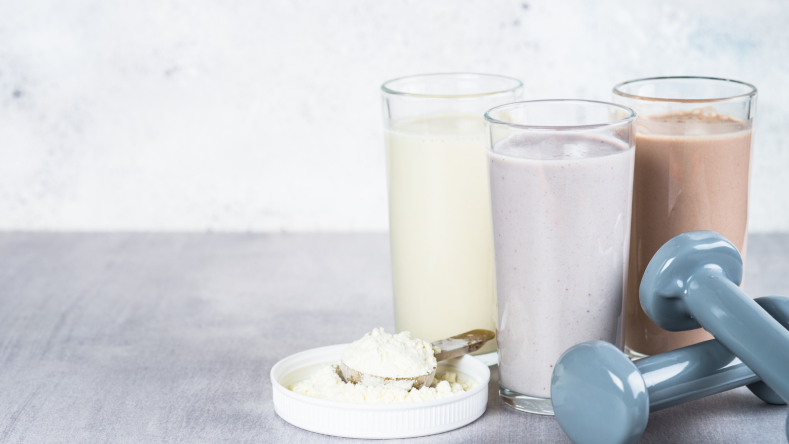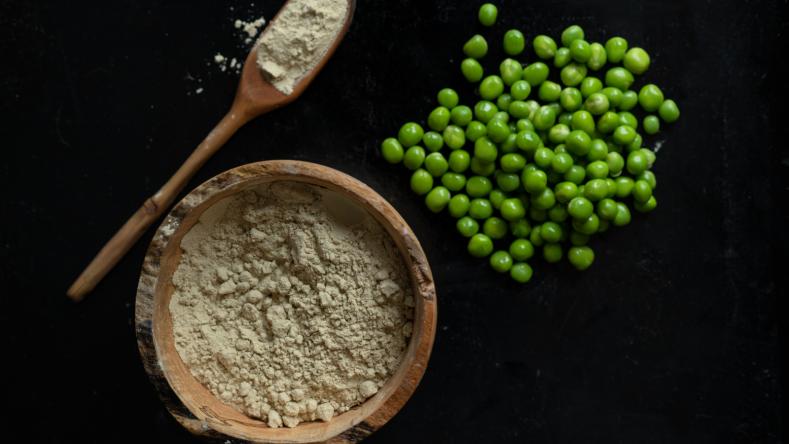The best forms of protein powder, according to science
Professional athletes and health enthusiasts alike have long been singing the praises of protein powder — and for a good reason. It can aid muscle growth, weight management, and athletic recovery. But with so many options on the market, how do you know which one is right for you? Here are the best forms of protein powder.

Whether you’re looking to lose weight, build muscle, or enhance recovery, protein powders can be an excellent supplement to consider. But with seemingly endless options on the market, how do you know which one is right for your specific goals? Before breaking down the different types of protein powder, let’s discuss what protein is, why you need it, and how it benefits your body.
Understanding protein: Protein building blocks, function, and sources
Protein is an essential macronutrient composed of 20 different amino acids, nine of which must be obtained from the diet because the body can’t produce them on its own. Amino acids are considered the primary building blocks of your body since they are found in muscles, tendons, bone, skin, hormones, tissue, enzymes, red blood cells, and more.
Dietary protein provides the amino acids your body needs to build and repair muscles, heal wounds and injuries, synthesize hormones and enzymes, and even store and carry oxygen throughout the body. Good protein sources include eggs, dairy, lean meat, poultry, fish, beans, lentils, soybeans, tofu, and supplements (such as protein powder) or protein-fortified foods.

Protein recommendations
How much protein you need varies with age and can increase significantly with physical activity, injury, or illness. The Dietary Reference Intake (DRI) for protein for sedentary adults is as follows:
Men and women: 0.8 g protein/kg of body weight/day [
1]
Over 65 years old: 1 to 1.2 g protein/kg of body weight/day [
2
]
Protein recommendations for athletes and highly active men and women range from 1.2-2.0 g/kg of body weight/day, depending on training needs and goals [ 3 4 5
While you can get adequate protein from dietary sources or supplementation, excessive consumption may cause digestive problems, such as nausea, bloating, cramping, flatulence, and diarrhea.
Benefits of protein
Besides being an essential macronutrient, here are a few other ways protein (and protein supplementation) aids with health.
Weight management. Evidence suggests that high protein diets (consisting of 25-30% of your daily caloric intake from foods and supplements) will boost your metabolic rate and aid with weight loss [
6
,7
].Muscle growth. If you’re looking to get extra gains in the gym, you may want to have that extra protein shake. Studies have found that those who consumed additional protein after weight lifting showed increased muscle size and strength compared to those who didn’t [
8
].Recovery after exercise. Since protein helps repair and build muscle, adequate consumption helps speed up recovery. Research shows that protein supplementation can ease soreness, reduce muscle damage, enhance muscle strength and size, and increase exercise performance [
8
,9
,10
].

Who should use protein powder?
Athletes, weight lifters, older adults, active men and women, vegetarians/vegans, and individuals with a chronic illness may find it challenging to get enough quality protein from foods and may benefit from using a protein powder supplement to help meet their protein goals.
Types of protein powder
Not all protein is created equal, and with so many on the market, it can be hard to know which one is best. Here is a brief overview of the two main types of protein powders (dairy and plant-based) that are good considerations.
Dairy-based protein powders
Whey protein.
Whey is one of the primary proteins found in dairy. It contains all of the essential amino acids, is highly digestible and quickly absorbed. It packs about 25 g of protein/serving. Whey protein is rapidly absorbed and rich in leucine, which helps kick start muscle repair and growth, making it a top choice among gym-goers and athletes [ 11
Here are some additional benefits of whey protein:
Lower blood pressure. Studies have found that whey protein may help lower blood pressure in pre-hypertensive adults [
22
].More stable blood sugar levels. Whey protein can moderate blood sugar levels when taken before a high-carbohydrate meal and may benefit those with type 2 diabetes [
23
].Lower cholesterol levels. Whey protein may support heart health, as research has found that high doses of whey protein can help reduce cholesterol levels over time [
25
].
Casein protein.
Casein is another type of protein found in dairy that provides your body with a slow, steady release of amino acids. This makes it ideal for fasting situations (such as while you sleep), weight loss (as it promotes satiety), and muscle growth [ 12 19 20 21

Plant-based protein powders
Soy protein powder.
Soy is a complete protein and aids in muscle building. It contains leucine (a branched-chain amino acid, or BCAA) to enhance muscle protein synthesis; however, studies have found that both whey and casein are superior in this respect [ 13
Interestingly, emerging evidence suggests that combining dairy and soy protein may result in greater muscle protein synthesis than if you were to consume each one separately [
18
].
Hemp protein powder.
Hemp protein is also considered a complete protein, as it has all nine essential amino acids. Additionally, it’s easy to digest and contains fiber, healthy fats, and other minerals, making this a good option for those with dairy allergies or who follow a plant-based diet [ 14
Pea protein powder.
With 15 g of protein/serving, this plant-based protein powder is rich in BCAAs and contains arginine and leucine to promote healthy blood flow, muscle growth, and protein synthesis [ 15 16 17

Blended plant protein powder.
Many plant-based protein powders contain a blend of several plant proteins, such as soy, pea, and brown rice. Most plant proteins are either low or missing one or more essential amino acids. By blending different sources of plant protein, manufacturers can create plant-based protein powders that provide all of the essential amino acids and at adequate levels.
What is personalized protein powder, and is it beneficial?
Personalized protein powder is a custom blend of protein designed to support your unique health and fitness goals and align with your dietary preferences. Think of it as a supplement and protein powder in one scoop, specifically designed for you. The type of protein powder, flavor, and functional additives such as probiotics and ashwagandha are manipulated to suit your goals and preferences.
Personalized protein powders are usually more expensive than their generic counterparts but can be an effective way to get the right blend of protein for your specific needs and often provide other functional nutrients.
Importance of third-party testing
When choosing a protein powder, look for ones that have been third-party tested. Protein powder products are notorious for containing contaminants such as BPA, lead and other heavy metals, and third-party testing is a good way to ensure that what you see on the nutrition label is what you get. Read more about our third-party testing process at Elo here
Summary
Whether you’re looking to lose weight, build muscle, or enhance recovery, protein powders can be a good supplement to consider adding to your diet. It can also be beneficial if you are an athlete, weight lifter, older adult, active man or woman, or a plant-based eater who struggles to reach your protein goals. However, not all protein is created equal, as whey and casein offer different benefits than their plant-based counterparts. Choosing the right protein powder that fits your needs can help improve performance, aid with weight management, and boost overall health.
Disclaimer: The text, images, videos, and other media on this page are provided for informational purposes only and are not intended to treat, diagnose or replace personalized medical care.
Key takeaways
Protein is an essential macronutrient and is composed of amino acids, many of which your body can’t produce on its own. As such, you need to consume them from food sources or supplements.
Adequate protein consumption aids with weight management, muscle growth, and exercise recovery.
If you are an athlete, weight lifter, older adult, active man or woman, have a chronic illness, or follow a vegetarian or vegan diet, you may find it necessary to use protein powder to meet your needs.
Whey and casein are dairy-based protein powders, whereas soy, hemp, and pea are plant-based protein powders.
Personalized protein powders are usually more expensive than their generic counterparts but can be an effective way to get the right blend of protein for your specific needs and often provide other functional nutrients.
References
Jäger, R., Kerksick, C. M., Campbell, B. I., Cribb, P. J., Wells, S. D., Skwiat, T. M., Purpura, M., Ziegenfuss, T. N., Ferrando, A. A., Arent, S. M., Smith-Ryan, A. E., Stout, J. R., Arciero, P. J., Ormsbee, M. J., Taylor, L. W., Wilborn, C. D., Kalman, D. S., Kreider, R. B., Willoughby, D. S., Hoffman, J. R., … Antonio, J. (2017). International Society of Sports Nutrition Position Stand: protein and exercise. Journal of the International Society of Sports Nutrition, 14, 20.
https://doi.org/10.1186/s12970-017-0177-8
Bauer, J., Biolo, G., Cederholm, T., Cesari, M., Cruz-Jentoft, A. J., Morley, J. E., Phillips, S., Sieber, C., Stehle, P., Teta, D., Visvanathan, R., Volpi, E., & Boirie, Y. (2013). Evidence-based recommendations for optimal dietary protein intake in older people: A position paper from the Prot-Age Study Group. Journal of the American Medical Directors Association, 14(8), 542–559.
https://doi.org/10.1016/j.jamda.2013.05.021
Stokes, T., Hector, A. J., Morton, R. W., McGlory, C., & Phillips, S. M. (2018). Recent Perspectives Regarding the Role of Dietary Protein for the Promotion of Muscle Hypertrophy with Resistance Exercise Training. Nutrients, 10(2), 180.
https://doi.org/10.3390/nu10020180
Carbone, J. W., & Pasiakos, S. M. (2019). Dietary Protein and Muscle Mass: Translating Science to Application and Health Benefit. Nutrients, 11(5), 1136.
https://doi.org/10.3390/nu11051136
Deldicque L. (2020). Protein Intake and Exercise-Induced Skeletal Muscle Hypertrophy: An Update. Nutrients, 12(7), 2023.
https://doi.org/10.3390/nu12072023
Pesta, D. H., & Samuel, V. T. (2014). A high-protein diet for reducing body fat: mechanisms and possible caveats. Nutrition & metabolism, 11(1), 53.
https://doi.org/10.1186/1743-7075-11-53
Veldhorst, M. A., Westerterp-Plantenga, M. S., & Westerterp, K. R. (2009). Gluconeogenesis and energy expenditure after a high-protein, carbohydrate-free diet. The American journal of clinical nutrition, 90(3), 519–526.
https://doi.org/10.3945/ajcn.2009.27834
Morton, R.W., Murphy, K.T., McKellar, S.R., et al. (2018). A systematic review, meta-analysis and meta-regression of the effect of protein supplementation on resistance training-induced gains in muscle mass and strength in healthy adults. British Journal of Sports Medicine, 52:376-384.
https://bjsm.bmj.com/content/52/6/376.citation-tools
Brown, M. A., Stevenson, E. J., & Howatson, G. (2018). Whey protein hydrolysate supplementation accelerates recovery from exercise-induced muscle damage in females. Applied physiology, nutrition, and metabolism = Physiologie appliquee, nutrition et metabolisme, 43(4), 324–330.
https://doi.org/10.1139/apnm-2017-0412
Kim, J., Lee, C., & Lee, J. (2017). Effect of timing of whey protein supplement on muscle damage markers after eccentric exercise. Journal of exercise rehabilitation, 13(4), 436–440.
https://doi.org/10.12965/jer.1735034.517
Miller, P. E., Alexander, D. D., & Perez, V. (2014). Effects of whey protein and resistance exercise on body composition: a meta-analysis of randomized controlled trials. Journal of the American College of Nutrition, 33(2), 163–175.
https://doi.org/10.1080/07315724.2013.875365
Res, P. T., Groen, B., Pennings, B., Beelen, M., Wallis, G. A., Gijsen, A. P., Senden, J. M., & VAN Loon, L. J. (2012). Protein ingestion before sleep improves postexercise overnight recovery. Medicine and science in sports and exercise, 44(8), 1560–1569.
https://doi.org/10.1249/MSS.0b013e31824cc363
Leucine concentrations of various protein sources. (n.d.). Retrieved January 20, 2022, from
https://www.researchgate.net/figure/Leucine-concentrations-of-various-protein-sources-Differentiation-is-made-between_fig2_280584886
Tang, C. H., Ten, Z., Wang, X. S., & Yang, X. Q. (2006). Physicochemical and functional properties of hemp (Cannabis sativa L.) protein isolate. Journal of agricultural and food chemistry, 54(23), 8945–8950.
https://doi.org/10.1021/jf0619176
Gornik, H. L., & Creager, M. A. (2004). Arginine and endothelial and vascular health. The Journal of nutrition, 134(10 Suppl), 2880S–2895S.
https://doi.org/10.1093/jn/134.10.2880S
Babault, N., Païzis, C., Deley, G., Guérin-Deremaux, L., Saniez, M. H., Lefranc-Millot, C., & Allaert, F. A. (2015). Pea proteins oral supplementation promotes muscle thickness gains during resistance training: a double-blind, randomized, Placebo-controlled clinical trial vs. Whey protein. Journal of the International Society of Sports Nutrition, 12(1), 3.
https://doi.org/10.1186/s12970-014-0064-5
McPherron, A. C., Guo, T., Bond, N. D., & Gavrilova, O. (2013). Increasing muscle mass to improve metabolism. Adipocyte, 2(2), 92–98.
https://doi.org/10.4161/adip.22500
Butteiger, D. N., Cope, M., Liu, P., Mukherjea, R., Volpi, E., Rasmussen, B. B., & Krul, E. S. (2013). A soy, whey and caseinate blend extends postprandial skeletal muscle protein synthesis in rats. Clinical nutrition (Edinburgh, Scotland), 32(4), 585–591.
https://doi.org/10.1016/j.clnu.2012.10.001
Demling, R. H., & DeSanti, L. (2000). Effect of a hypocaloric diet, increased protein intake and resistance training on lean mass gains and fat mass loss in overweight police officers. Annals of nutrition & metabolism, 44(1), 21–29.
https://doi.org/10.1159/000012817
Yamamoto, N., Ejiri, M., & Mizuno, S. (2003). Biogenic peptides and their potential use. Current pharmaceutical design, 9(16), 1345–1355.
https://doi.org/10.2174/1381612033454801
Mariotti, F., Valette, M., Lopez, C., Fouillet, H., Famelart, M. H., Mathé, V., Airinei, G., Benamouzig, R., Gaudichon, C., Tomé, D., Tsikas, D., & Huneau, J. F. (2015). Casein Compared with Whey Proteins Affects the Organization of Dietary Fat during Digestion and Attenuates the Postprandial Triglyceride Response to a Mixed High-Fat Meal in Healthy, Overweight Men. The Journal of nutrition, 145(12), 2657–2664.
https://doi.org/10.3945/jn.115.216812
Yang, J., Wang, H. P., Tong, X., Li, Z. N., Xu, J. Y., Zhou, L., Zhou, B. Y., & Qin, L. Q. (2019). Effect of whey protein on blood pressure in pre- and mildly hypertensive adults: A randomized controlled study. Food science & nutrition, 7(5), 1857–1864.
https://doi.org/10.1002/fsn3.1040
Mignone, L. E., Wu, T., Horowitz, M., & Rayner, C. K. (2015). Whey protein: The "whey" forward for treatment of type 2 diabetes?. World journal of diabetes, 6(14), 1274–1284.
https://doi.org/10.4239/wjd.v6.i14.1274
Zhou, L. M., Xu, J. Y., Rao, C. P., Han, S., Wan, Z., & Qin, L. Q. (2015). Effect of whey supplementation on circulating C-reactive protein: a meta-analysis of randomized controlled trials. Nutrients, 7(2), 1131–1143.
https://doi.org/10.3390/nu7021131
Tahavorgar, A., Vafa, M., Shidfar, F., Gohari, M., & Heydari, I. (2015). Beneficial effects of whey protein preloads on some cardiovascular diseases risk factors of overweight and obese men are stronger than soy protein preloads – a randomized clinical trial. Journal of Nutrition & Intermediary Metabolism, 2(3-4), 69–75.
https://doi.org/10.1016/j.jnim.2015.08.002






